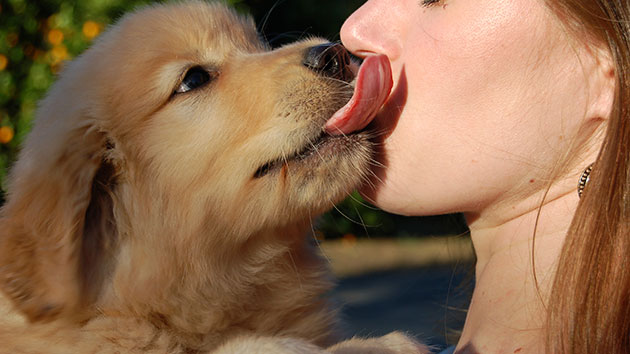Dog Saliva: 5 Fast Facts You Should Know

Many of us don’t think twice about the saliva that comes out of our dog’s mouth when we lean in for a slobbery kiss. Affection between humans and their pets is not uncommon. However, what is common is the lack of education surrounding animal saliva, its bacteria, and how it impacts both humans and pets. According to PetMD, here are five fast facts about dog saliva that can change the way you think about your pet and its mouth.
Dog saliva helps prevent canine cavities. The saliva found in the mouths of dogs is better suited to prevent cavities, in comparison to human saliva.
“[Human saliva] has a PH of 6.5 to 7,” says Dr. Colin Harvey, emeritus professor of surgery and dentistry at the School of Veterinary Medicine at the University of Pennsylvania. “The saliva of dogs and carnivores in general is slightly alkaline, around 7.5 to 8. The significance of that difference is that dogs do not get dental cavities nearly as frequently as humans. The slightly alkaline nature of dog saliva buffers the acids that are produced by some bacteria that are the cause of the enamel of the tooth being eroded away.”
Saliva helps dogs with digestion, but not in the way you think. “There are no digestive enzymes present in the saliva of dogs,” Harvey says. “It is purely designed to get the food down into the stomach so the digestive process can start.
In fact unlike people, dogs don’t have to chew their food to mix in the saliva and start the digestive process. A dog’s stomach and intestines can do all the necessary work. The pure, simple function of dog saliva is to move food down the esophagus.
Dog saliva is antibacterial. “Dog saliva does contain chemicals that are antibacterial and it’s very unlikely that saliva by itself would be a direct cause of infection,” says Harvey. “You often see dogs licking wounds and that is a cleansing action and an antibacterial action to promote the healing of a superficial wound.” Of course licking won’t cure all superficial infections in dogs, so veterinary visits are still often necessary.
Dog “kisses” may transfer bacteria to humans. Just because dog saliva has antibacterial properties does not mean that dog “kisses” are clean and humans should let their guard down. Dr. Edward R. Eisner, the first veterinarian to become a board-certified specialist in Veterinary Dentistry in Colorado, notes that it’s possible for bacteria to be transferred from pets to humans. One study published in Oral Biology in 2012 found that there can be a transmission of periodontopathic species of bacteria between dogs and their owners.
Dog saliva may produce allergies in humans. While many people believe that pet fur is the culprit of allergic reactions to dogs, many of these allergies actually stem from proteins found in dog saliva. According to a study published in the European Journal of Allergy and Clinical Immunology, dog saliva contains at least 12 different allergy-causing protein bands. When dogs lick their fur, the saliva dries, and these proteins become airborne. Researchers who conducted the study concluded that dog saliva has greater potential as an allergen source than dog dander.
Source: PetMD, 2016
4244 Madison Avenue, Trumbull, CT 06611
© 2016-2022 Wet Paws Dog Grooming, LLC. All rights reserved.
